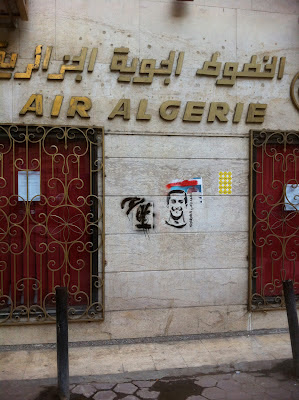I'm taking part in an online exhibition called "Muslim Women's Arts & Voices," which is being organised by the San Francisco-based International Museum of Women and is set to launch in early 2013. Muslim women from around the world will be engaging in monthly workshops and discussions in different cities and contributing works of art/writing/poetry/photographs/video, etc, for the exhibition.
We had our first workshop in Sharjah, a city in the United Arab Emirates, earlier this week and I felt so enlivened and inspired by the richly diverse and talented women I met. We were asked to bring one object to represent our identity. I had jotted down some ideas on what I would like to say about myself -- as well as the object I chose which was, simply, a sharpened pencil -- prior to the workshop. Thought it would be relevant to share these here, too!
.....................................
My name is Daliah Merzaban, I have Egyptian roots, I was born and raised in Canada and I’ve lived in the UAE for seven years working as a financial journalist, analyst and editor. In my current role, I’m an emerging markets editor at Bloomberg News covering finance in the Middle East and North Africa.
That’s my day job. But what I have become most passionate about in the past few years is uncovering the layers of my faith in God through Islamic spirituality, and I write about this journey on my blog, which I started almost two years ago, as well as for the Huffington Post.
For my object, I wasn’t very complex, I chose a pencil and the notepad that accompanies it. If I am to choose one thing that I have carried with me throughout my life it is this item: I’ve been a journalist since I was 17, and before that was always very interested in creative writing, poetry, short stories, from a very young age. So the written word is what I spend most of my very long hours in the office and my free time working with.
I also chose a pencil because before I truly embraced my Islam, I perceived faith as something I needed to enter into with my eyes closed, without rationale, analysis or intellect. To my surprise, as I have investigated Islamic teachings more thoroughly in the past three years, I realised that it was through the acquisition of knowledge and use of reason and logic that certainty of God’s existence becomes most palpable. For me, the pencil is a very simple representation of the acquisition of knowledge, which is a fundamental right for every human being.
In the Quran in Surah 96, God reveals to Muhammad, peace and blessings be upon him, a verse through the Angel Gabriel whereby he orders the Prophet to "Read!" Saying: “Your Lord is the Most-Bountiful One. Who taught by the pen. Taught man what he did not know.” I think these words underscore our responsibility as Muslims to acquiring knowledge to gain a more thorough understanding of our faith.
A pencil is not permanent, it needs to continue to be sharpened and it represents my understanding that I’m on a journey of discovery and I don’t have all the answers. I need to always keep an open mind, and a blank piece of paper in my notebook.
(Read about how studying Arabic reignited my love of pencils and the written word here)

































